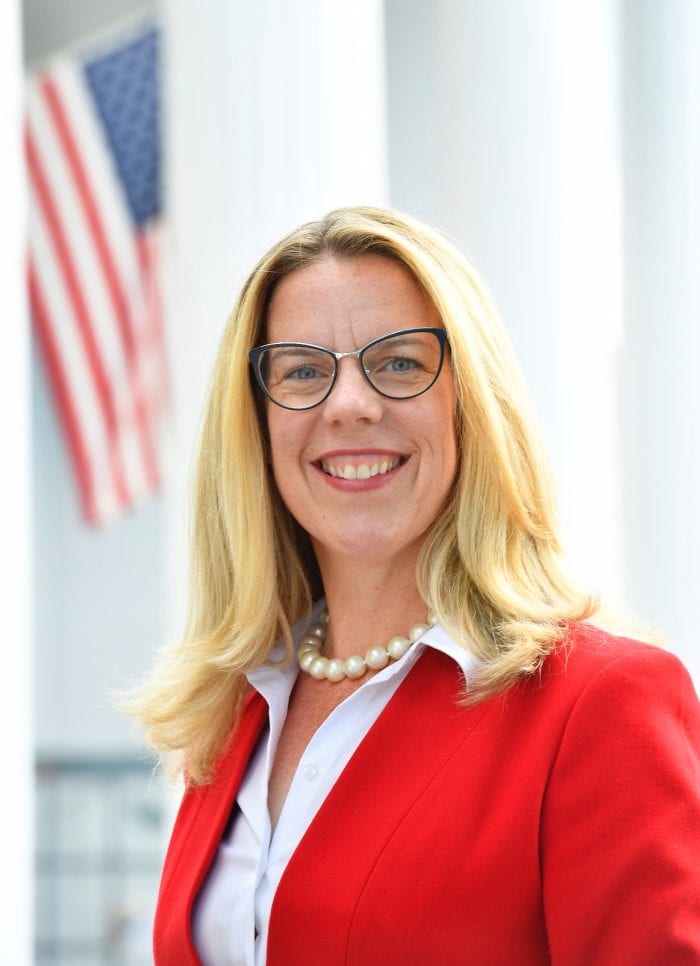Before she gets to the long list of initiatives she wants to act on this year, Suffolk County Legislator Kara Hahn (D-Setauket) said combating the coronavirus is priority number one.
After just four weeks into the new year, the deputy presiding officer for the county Legislature said that while she has a lot of goals to accomplish before the end of 2021, COVID-19 is the biggest hurdle to overcome.
“The most important thing that anyone can be working on right now is COVID response and recovery for residents, for businesses, for communities as a whole,” she said. “A lot of things have been kind of put on the backburner because of the need to focus on COVID.”
Hahn said that while the pandemic has been ongoing for nearly a year now, she keeps reminding the county Department of Health Services that notes need to be taken and research must continue.
“We have to be looking at this not only in the now,” she said. “What are we learning from this? How can the next time this happens — because there will be a next time, it’s just a matter of when — how can we have learned from this?”
Hahn said in order to move forward, the virus and the issues it brought on throughout 2020, like food insecurity and evictions, will have to be addressed even after the vaccine.
“Getting through this from a health perspective, and then recovering from it for every person’s financial impact, mental health … people are just going to start to hurt even more,” she said. “We haven’t seen the full repercussions.”
Hahn made it clear that while the county recovers from the aftermath of COVID-19, she keeps busy with some of her other plans to help the environment, reduce traffic and keep people safe on Long Island.
Infrastructure
Hahn is hoping that the federal government with disperse funding to county infrastructure projects, she said, and two of the most prominent projects in her district include the electrification of the Long Island Rail Road from Port Jefferson Station, and an overpass on Route 347 going over Nicolls Road.
The decades-long debate about electrifying the LIRR has been discussed by many and will continue to be debated, along with the possibility of EPA Superfund site, the Lawrence Aviation property, to become a rail yard for electric trains.
“So that if that happens, it is the most critical thing that could happen for my district from an infrastructure perspective,” she said. “Right now, the electric train stops at Huntington and the time it takes to get into Manhattan to Penn Station more than two hours.”
With the electrification, she said, 20 to 25 minutes will be cut off the journey, with no switches in Huntington.
“They can go a little bit faster, they are much more efficient in energy and obviously less polluting,” she added. “Once you cut off almost a half an hour from that trip, the property values around those stations go up significantly, just being within that kind of vicinity to Manhattan.”
Hahn said that electric trains could help students at Stony Brook University, revitalizing the downtown, and allowing students to live in the village, close enough to hop on a train to class.
“You can create different things with an electric line that would make for better movement of people between Huntington and Stony Brook, Huntington and Port Jeff, or Port Jeff and Stony Brook,” she said.
And that could help eliminate traffic on Nicolls Road. The overpass there, which has also been heavily discussed for years, is another project she’d like to see through.
“The intersection of Nicolls Road and 347 is incredibly unsafe,” Hahn said. “There are accidents there all the time. I’ve witnessed more than one in my lifetime.”
The overpass would be federally funded and wouldn’t be completed for many years, she said, but it would be critical in alleviating traffic that comes from the university and the hospital.
“Having that intersection function better is critical to a number of regional objectives,” she said. “So, having those funds would be terrific.”
Retail recycling
As chair of the Environment, Parks & Agriculture Committee in the county Legislature, as well as chair of the Economic Development, Planning & Housing Committee, Hahn hopes to see the launch of a recycling retail campaign called Reclaim Our Land.
“Every year the amount of land left to preserve and protect is smaller and smaller,” she said.
So, in an effort to buy back land for greenery and parks, Hahn said the vision is to reclaim areas that have been built on and have abandoned.
In terms of development, reclamation costs more than preservation, she said, so building on an empty acre is cheaper than buying a previously built building, demolishing and rebuilding something new. But now with constant bankruptcies and the fall of big-box stores, Hahn said the number of vacant buildings across Suffolk County, alone, is constantly increasing.
“I’ve been noticing it in the last two years prepandemic, but COVID just really accelerated it,” she said.
Bookstores, supermarkets and stores like Sears or JCPenney in the Smith Haven Mall have left huge spaces with nothing to fill.
“When JCPenney’s was going out of business, I thought, ‘This is great place to have some housing, have some maybe office space,’” Hahn said. “It’s large, it’s got parking, it’s got sewers, it’s got electric — it’s already there. There’s already a bus that goes to the university campus.”
With problems of students living in communities or causing issues with illegal housing, Hahn said there has been discussion on how to create a place that young people can live, that’s convenient and appealing.
“Wouldn’t it be great if we could encourage these stores that have been vacant for a long time to be recycled into something the community needs?” she said. By creating affordable micro apartments for single, young people, it could help smaller shops and reduce traffic.
“That’s what was so important to me about the recycling retail,” she said. “Let’s try to incentivize developers to recycle what already exists, so that we don’t have to build on the green space.”






